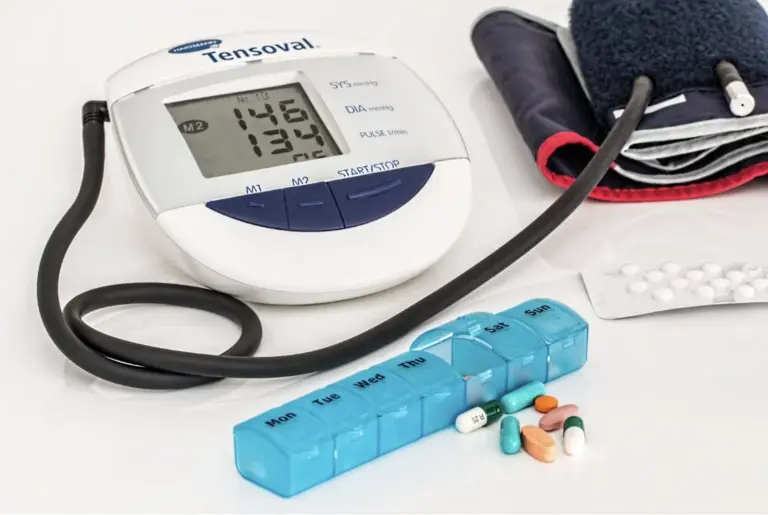Hypertension is a widespread medical condition these days. One in every four adults in India is hypertensive, and only 12% of patients have it under control. Genetic predispositions, a sedentary lifestyle, stress, and bad dietary habits cause this condition. However, undiagnosed thyroid may lead to hypertension. This connection between thyroid and blood pressure has been known for a long time but has largely gone unnoticed.
Hypertension is often called the “silent killer.” You may not know you have it until you experience a stroke or heart attack. Hence it is even more challenging to gauge if it was caused due to thyroid or some other underlying health condition. This blog will discuss the link between thyroid and high blood pressure and how they can be prevented and treated.
What is Thyroid?
The thyroid gland is a butterfly-shaped organ in the front of the neck. It produces hormones that regulate many body processes, such as heart rate, blood pressure, body temperature and energy levels.
Thyroid hormones control how your body uses energy. They affect how fast your heart beats and how efficiently your muscles use oxygen. You may feel tired and weak when your thyroid doesn’t make enough hormones. You may also have trouble concentrating and thinking clearly.
The following are the two types of thyroid disorders:
Hypothyroidism
This is the most common cause of low thyroid hormone levels. It happens when your thyroid gland produces too little thyroid hormone. It is diagnosed by a blood test that measures the amount of free and total thyroxine (T4) in your body. If you have hypothyroidism, you may experience weight gain, fatigue, muscle and joint pain, constipation, and depression. Treating hypothyroidism involves taking synthetic hormone supplements to replace what your body doesn’t produce naturally.
Hyperthyroidism
This condition occurs when your thyroid produces too much thyroid hormone. Hyperthyroidism is usually caused by an overactive thyroid gland but sometimes can be due to cancer or other conditions that affect how your pituitary gland releases thyroid-stimulating hormone (TSH). Hyperthyroidism can cause irritability, anxiety, insomnia, heart palpitations, sweating, heat intolerance and muscle weakness. Sometimes hyperthyroidism goes away without treatment; other times, treatment involves taking radioactive iodine or anti-thyroid medications.
What is the link between thyroid and hypertension?
The link between thyroid and hypertension is well known. The thyroid hormone plays a vital role in regulating the body’s metabolism and controlling blood pressure by affecting the heart rate, blood vessel tone and blood volume.
The main cause of high blood pressure is an increase in the heart’s contraction force. When this happens, the heart has to pump more blood to maintain normal blood pressure. This causes high blood pressure.
High thyroid hormone levels cause increased levels of T3 and T4 hormones in your body, which are responsible for increasing heart rate. This results in widening arteries and growing resistance to the heart pumping system, leading to high blood pressure.
Hypertension due to thyroid disorder or hypertension thyroid can get serious in no time. Therefore, negligence is not an option if you are hypertensive or notice any thyroid hypertension symptoms, such as irregular blood pressure levels, headache, dizziness, and weight loss.
A correct diagnosis is key!
Hypertension is a silent killer that should never be taken for granted. There are many considerations to keep in mind when it comes to managing this condition. In many cases, there are underlying issues that need to be addressed. And that starts with having the right medical providers guiding you through these issues. If you have any questions regarding hypertension, you can visit the BPinControl Platform for medically accurate and verified information, and you can also consult with leading hypertension specialists in India.
Disclaimer
The information contained in this article is to educate, spread awareness in relation to hypertension and other diseases to the public at large. The contents of this article are created and developed by BPinControl.in through its authors, which has necessary, authorisations, license, approvals, permits etc to allow usage of this articles on The Website. The views and opinions expressed in this article are views, opinions of the respective authors and are independently endorsed by doctors. Although great care has been taken in compiling and checking the information in this article, The Website shall not be responsible, or in any way liable for any errors, omissions or inaccuracies in this article whether arising from negligence or otherwise, or for any consequences arising therefrom. The content of this article is not a substitute for any medical advice. The Website shall not be held responsible or liable for any consequence arising out of reliance on the information provided in the article.




